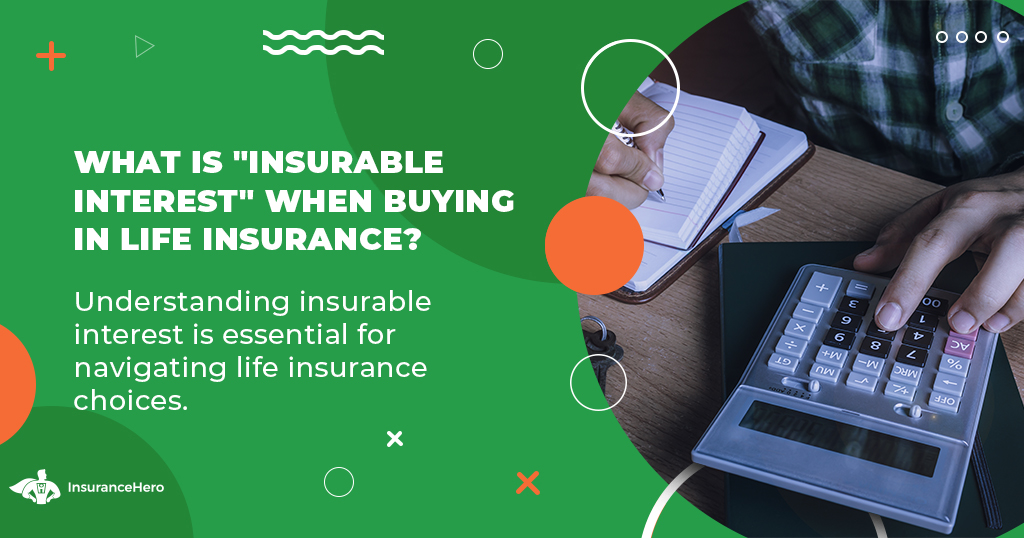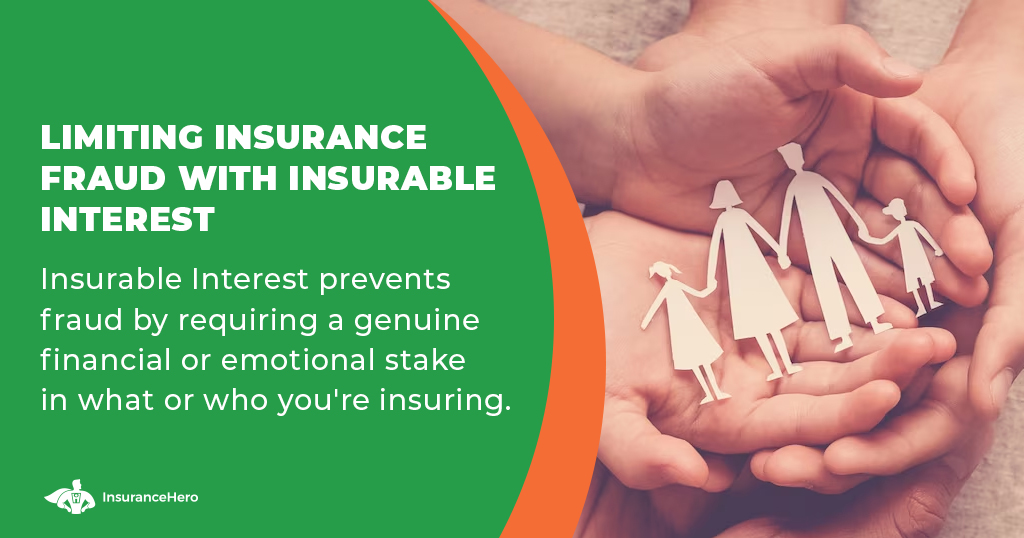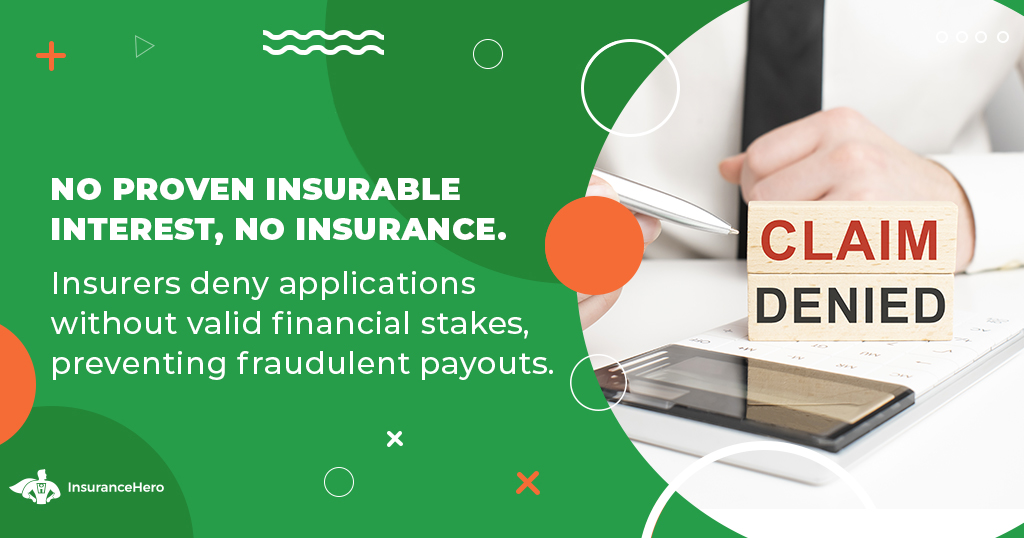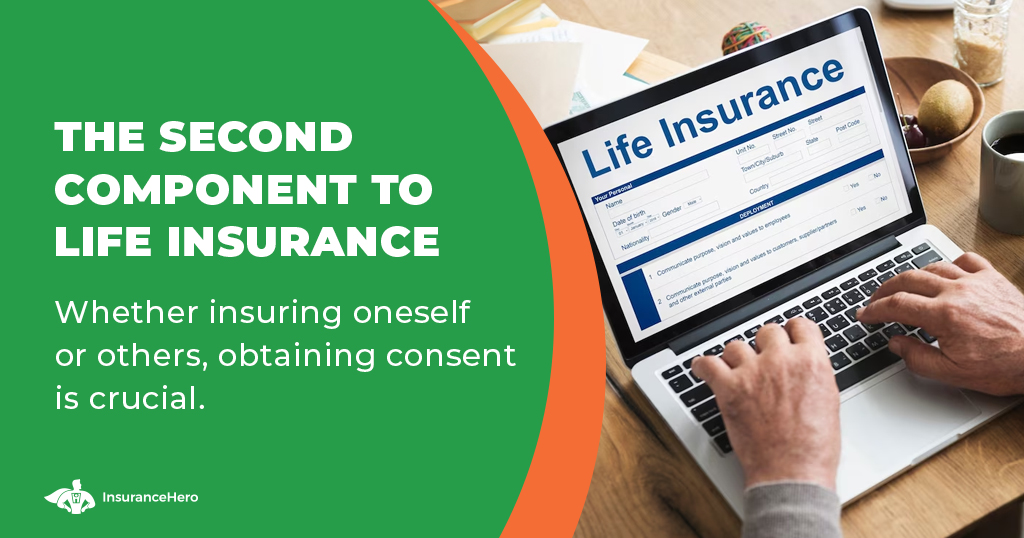What Is Insurable Interest In Life Insurance?

Life insurance traditionally works as a form of self-insurance. You purchase a policy on yourself and name a beneficiary, typically a spouse.
When you pass away, whether from natural causes over the course of decades or an unexpected tragedy, your life insurance policy triggers and your benefits are paid to the beneficiary.
However, that’s not the only way it can operate. Another relatively common way is to take out a life insurance policy on someone else.
For example, a husband might take out an insurance policy on their wife; if their wife passes away, they receive the benefits. Meanwhile, the wife can take out a policy on the husband for the same effect.
Note: This kind of double policy isn’t universal. Often, newly married couples in the UK will purchase joint policies to get cheaper premiums, though they come with restrictions. That’s a subject for another article, though.
Life insurance is also not limited to spouses. You can purchase life insurance for anyone (within limits) whose loss would be a financial, emotional, or other hardship to you.
While this is typically spouses, it can also include business partners, children, and even key employees in a company. You can also take out a policy on your parents (assuming they don’t have one of their own) and former spouses, siblings, and others.
Every life insurance policy involves three parties: the insured, the purchaser, and the beneficiary.
This can be three different people (a husband purchases life insurance to cover the wife, which pays out to the child), or two roles can be filled by one person (a husband buys life insurance to cover himself and payout to the spouse or child)
One thing you’ve probably read in fiction is taking out a life insurance policy on someone and then “bumping them off” to receive a payout.
It’s an old concept from mystery and thriller stories. Still, it virtually never happens in real life for two significant reasons, one of which we’re discussing today: Insurable Interest.
So, what is Insurable Interest? How does it limit your insurance policy decisions, and how do you navigate it when you want to buy a policy? Read on to find out more.

Limiting Insurance Fraud with Insurable Interest
Insurable Interest is a mechanism insurance firms use to limit who can purchase insurance for another. It helps prevent things like buying insurance for someone you’ve never met.
So, what is insurable interest?
“The interest that a person has in something such as a particular property or another individual, which means that the person would suffer a loss should that property or individual be harmed.
In insurance law, you can only buy insurance for something or someone in which you have an insurable interest.” – Association of British Insurers“
You can only insure something or someone if you would suffer a loss if that something were stolen or destroyed or if someone dies. You can only insure a car if you own that car; you can only insure a house if you own the house; and you can only insure a person if you have a vested interest in that person.
In essence, you need to receive some kind of benefit from the individual you’re insuring remaining alive, such that their loss is your loss. This is most often financial, but can be other forms of loss as well, particularly emotional, which is a primary basis for insuring a spouse with no income.
Who Needs Insurable Interest?
Insurable Interest needs to be proven to an insurance company to buy a life insurance policy on someone, but there’s more to it than just proving your own interest.
Insurable interest must exist for both the purchaser of the policy and the beneficiary of the policy. In some cases, those are the same person; you are buying a policy on your spouse for your own benefit.
In other cases, the purchaser and the beneficiary may differ; in such cases, both parties must have an insurable interest.

Insurable interest must be presented and proven to the insurance company at least twice, once when the policy is purchased and once again when it’s paid out. Insufficient proof of insurable interest is one of many reasons why a payout can be denied.
Insurable interest is a nonnegotiable aspect of life insurance policies. Without an insurable interest, the policy can be void or denied.
It is the duty of the policy owner to prove that they have an insurable interest in the insured party. Proof must be presented at application as well as at the end of the policy when the insured has passed away.
There’s an exception to this. You are always, by default, considered to have an insurable interest in yourself. Therefore, if you purchase a policy for yourself, you don’t need to prove your insurable interest in yourself.
Furthermore, whoever you name as beneficiary does not need to prove insurable interest in you because it’s assumed you would only pick someone as a beneficiary if such an interest exists.
This effect also extends to certain blood relationships and direct dependents. Spouses, children (including adopted children), siblings, parents, grandparents, grandchildren, and similar relationships are assumed to have insurable interest by default.
This allows insurance companies to avoid investigating simple family dynamics, sorting out family animosity, making judgment calls, or otherwise causing problems. At the same time, they can then focus on the more exotic cases where insurable interest may need to be proven.

Secure Your Family's Future With Life Insurance
Get a Free Life Insurance Quote Today - No Obligation!
Click Now For A Free Quote >>Is Insurable Interest Different for Different Kinds of Life Insurance?
Life insurance comes in two forms:
Term life insurance lasts for a fixed duration, usually 10, 20, or 30 years. Suppose you outlive the insurance term. In that case, you lose the benefits unless you purchase a new term (usually a slightly higher premium) or roll it over into a whole-of-life insurance policy.
Meanwhile, permanent life insurance is much more like traditional insurance, which works as long as you continue paying premiums.

So, does insurable interest differ between these? The simple answer is no. Insurable interest is a singular concept that applies to life insurance.
The only significant difference is that, for term life insurance, if you buy a new policy, you may need to prove insurable interest again as part of the process. This depends on whether you’re rolling over your previous term into a new term, or you’re changing insurers or policies in some way that would necessitate a new evaluation.
How is Insurable Interest Proven?
Insurable interest doesn’t need to be proven in the case of blood and marriage relations, but in other cases, it does.
To confirm that an insurable interest is present, a life insurance company will usually talk to the policy owner, beneficiary and insured.
They will investigate the relationship to the proposed insured and evaluate if there is an insurable interest. If an insurable interest is not found, the policy would be denied at the application or the death benefit would not be paid out.
Generally, there will be two elements to proving insurable interest outside cases where proof isn’t necessary. The first is financial statements indicating that the policy beneficiary is dependent on the insured.
So, for example, consider a case where a child has been abandoned by their parents and is being raised (but not legally adopted by) an aunt and uncle.
The aunt and uncle can take out a life insurance policy on themselves for the child’s benefit. However, since aunt/uncle relationships do not fall into the automatic insurable-interest category like parental relationships, they must prove insurable interest.
Fortunately, those financial statements will be easy to obtain since they are used to raise the child.

The second element is a bit less formal and typically involves a brief phone interview with an insurance company representative. They’ll ask some questions about the relationship between the insured and the beneficiary, and if all seems satisfactory, insurable interest will be confirmed.
Most of the time, as long as there’s a legitimate relationship and reason for life insurance, there won’t be any reason to deny insurable interest. It’s only in cases where fraud is likely or obvious, or in business relationships where things can be much more complicated, that investigations get more challenging.
What Happens if Insurable Interest Isn’t Proven?
“Sometimes, insurable interest cannot be proven. For instance, you would not be able to take out a life insurance policy on your elderly neighbor just because they are sick and may die soon if you cannot prove you would face financial hardship after they pass away.” – Bankrate
In cases where insurable interest can’t be proven, or the proof supplied is deemed inadequate or questionable by the insurance company, only one thing can happen: the insurance company denies the application.

When there’s no insurable interest, there can be no insurance. Consider other forms of insurance; you can’t insure your neighbour’s car and get a payout if they wreck it. It’s the same concept. Insurance companies don’t want to issue contracts that could result in fraudulent payouts.
Say, for example, you have an elderly neighbor who is 90 years old. You consider taking out a life insurance policy on your neighbor as she does not have many more years to live. This would not be a situation where an insurable interest would be present, as you would not suffer a financial loss from the death of your neighbour.
This is also why there’s another interview when life insurance comes to fruition and needs to be paid out. If insurable interest has disappeared along the way, the insurance company is within their rights to deny the payout.
This doesn’t happen often, especially for standard life insurance (particularly the kind with insurable interest built in, like between spouses or blood relations). Still, it can be more common between business partners and other such cases.
The Second Component of Life Insurance
Above, we mentioned that insurable interest is one of two components designed to help prevent insurance fraud. The second component is critical as well: consent.
Consent is simple. The person being insured—and whose death will trigger the insurance payout—needs to consent to having the insurance policy taken out. The insurance company will contact the insured and obtain that consent before it can issue a policy.

Of course, consent is easy if you’re insuring yourself. It’s trickier when insuring someone else, like a spouse, child, or parent. It’s also required in business partnerships where life insurance on a critical employee or executive is purchased; that critical employee must also give their consent.
Much like insurable interest, consent is obtained relatively quickly, usually by signing paperwork. And, much like insurable interest, if there’s no consent, there’s no policy. The insurance company will not issue a policy on someone who does not consent to be insured.
Consent is a primary mechanism to keep individuals informed. You can’t buy a policy on someone without their knowledge, because their consent is required.
Let Insurance Hero Help You
Life insurance should be part of almost everyone’s overall coverage. Purchasing life insurance can be a hassle, though, which is where we come in.
By filling out a simple form, you will receive a range of precise, customised, and excellent quotes from trusted insurance companies across the UK.

You don’t even need to prove insurable interest to us. Since we’re gathering quotes from our trusted partners, you only need to demonstrate insurable interest when you accept a quote and apply for insurance coverage.
Until then, you don’t need to jump through any hoops; fill out a form, and you’re a button press away from the best insurance quotes you can get in the UK.
Want to get started? Just click here. If you have any questions about our services, our process, or the quotes you receive, feel free to ask us directly. We’re always happy to help!
Steve Case is a seasoned professional in the UK financial services and insurance industry, with over twenty years of experience. At Insurance Hero, Steve is known for his ability to simplify complex insurance topics, making them accessible to a broad audience. His focus on clear, practical advice and customer service excellence has established him as a respected leader in the field.


